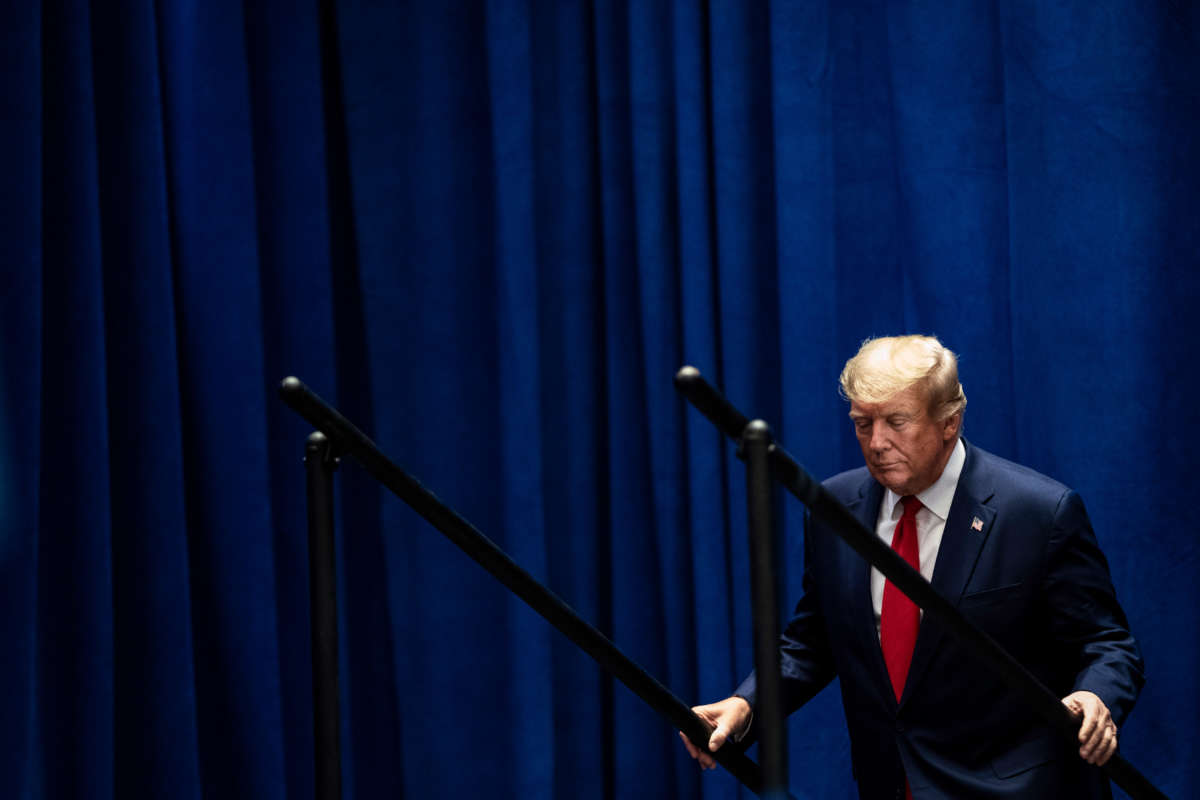The federal judge who ruled in favor of former President Donald Trump’s request for a special master to review documents that the FBI retrieved from his Mar-a-Lago home rejected a proposed “friend of the court” amicus brief that was submitted in opposition to her decision.
According to the filing, which was first reported on by Hugo Lowell of The Guardian, the brief was submitted by former Department of Justice (DOJ) and state officials who have “served in Republican administrations and collectively have decades of experience prosecuting cases involving sensitive materials or advising on matters regarding the proper scope of executive power and executive privilege” — including former federal prosecutors Donald B. Ayer, Gregory A. Brower, John J. Farmer Jr., Stuart M. Gerson, Peter D. Keisler and William F. Weld. Former New Jersey Gov. Christine Todd Whitman also signed onto the brief.
The signers sought to showcase that the DOJ’s search of Trump’s estate in Palm Beach, Florida, was not partisan — and that there was no need for a special master, given that the DOJ had already utilized an independent filter team to search for privileged documents.
“[R]egardless of one’s political views, it is clear that there is no legal support for the relief requested by the former President,” the signers said in the brief, which was submitted before Judge Aileen Cannon issued her ruling.
The brief asserted that there was “no legal basis” to appoint a special master to review the documents retrieved by the FBI, according to reporting from Law & Crime. Even if one could argue that a special master was needed to protect Trump’s attorney-client privileges, the signers said that the executive privilege claims were improper, as the documents were at the private home of a person who is no longer president.
The decision by Cannon, who was appointed by Trump himself, is not necessarily unusual; while most judges allow amicus briefs to be submitted, some have been known to limit their use.
But because the brief was signed by such prominent former officials, some have questioned Cannon’s rejection of the brief.
Cannon issued a one-sentence, paperless order in deciding to not include the amicus brief. “Upon review of the Motion, the Court appreciates the movants’ willingness to participate in this matter but does not find the proposed appointment of amici curiae to be warranted,” she said.
Because she omitted her reason for rejecting the brief, some have deemed her order to be more political than judicial.
“I don’t believe that I’ve ever seen a court reject a proposed amicus brief, especially from eminent amici like the Former GOP prosecutors Cannon just refused to hear from,” said Los Angeles Times legal affairs columnist Harry Litman, who is also a former U.S. attorney. “That’s now several bizarre & non-judicial moves, starting w/ her first announcement of intent to grant” a special master.
“That Judge Aileen Cooper refused this amicus brief is the punctuation on the outrageous and lawless order she issued,” Janai Nelson, president of the NAACP Legal Defense and Educational Fund, said in a tweet. “Fellow jurists should be outraged by these actions that undermine any sense of impartiality in this process.”
“I’ve been stuck on this all night,” lawyer Peter J. Tomasek wrote hours after news reports of the brief being rejected. “Why on earth would you reject an amicus brief? Just accept it and ignore it if you have to. But saying no is so, so odd.”
Amicus briefs are common, especially in high-profile cases where new precedents could be established. Those who file amicus briefs are not parties to the case, but have strong interests in its outcome nevertheless.
Their inclusion in court documents — or, in this case, their exclusion — can also sometimes be cited by appeals court judges.
Cannon’s decision to allow a special master to review the documents, fulfilling Trump’s special request two weeks after the search occurred, was questioned by many legal scholars. Also controversial was her acceptance of the argument that Trump, as a former president, can assert some aspects of executive privilege, which could set a dangerous precedent.
Cannon’s ruling was “an unprecedented intervention by a federal district judge into the middle of an ongoing federal criminal and national security investigation,” said Stephen I. Vladeck, a law professor at the University of Texas.
Join us in defending the truth before it’s too late
The future of independent journalism is uncertain, and the consequences of losing it are too grave to ignore. To ensure Truthout remains safe, strong, and free, we need to raise $33,000 in the next 2 days. Every dollar raised goes directly toward the costs of producing news you can trust.
Please give what you can — because by supporting us with a tax-deductible donation, you’re not just preserving a source of news, you’re helping to safeguard what’s left of our democracy.
